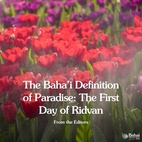The views expressed in our content reflect individual perspectives and do not represent the official views of the Baha'i Faith.
Our greatest freedom is the freedom to choose our attitude. – Victor Frankl
They must in every matter search out the truth and not insist upon their own opinion, for stubbornness and persistence in one’s views will lead ultimately to discord and wrangling and the truth will remain hidden. – Abdu’l-Baha, Selections from the Writings of Abdu’l-Baha, p. 88.
We attach an emotion to every situation we experience–and we can choose the emotion we feel.
This reality forms the core of a field of human psychology that’s come to be known as Emotional Intelligence (EI). The Baha’i teachings reinforce this reality when they say “I will no longer be sorrowful. I will be a happy and joyful being.”
A number of variants on EI exist currently in the psychological community, but the basic theory operates on this premise: although most of us accept feelings as being imposed upon us, and believe that we have no choice about how we feel, in reality we can choose to feel differently. At the turn of the last century, William James said, “The greatest discovery of my generation is that a human being can alter his or her life by altering his or her attitudes of mind.”
This literally means that changing our feelings about a situation will allow us to think differently about it. Emotion gives life meaning, without emotion the world would be a cold and lonely place. With too much emotion, however, life can overwhelm us. Emotional Intelligence tells us that we naturally attach feelings to any situation we face. The situation and the feelings together give any event meaning for us, and that meaning allows us to act.
Here’s one example: I was asked to come in and work with a local Indian tribal colony. Their education department faced many challenges. Parents and staff had become very upset with the services, and wanted to see change. They planned to hold a meeting to address all these problems, and asked me to facilitate the meeting.
People often see change as crisis or conflict, instead of insight or opportunity. Focusing on the conflict is like focusing on darkness, with both created by the absence of light. So I teach people that you have to begin by focusing on what works, and by looking to the future. Stopping what doesn’t work isn’t the same as starting what can work. In the same way, to effect change requires focusing on the virtues and not on the vices.
How would you promote empathy among thirty people in conflict with one another? How can you break the patterns of a broken past?
 I thought about the Baha’i approach to consultation, then I asked everyone to sit in a circle and we began the day with a native blessing focusing on the virtues of the community. The prayer had a purpose–to remind those present to allow the common virtues of unity, humility and trust to manifest in our discussion.
I thought about the Baha’i approach to consultation, then I asked everyone to sit in a circle and we began the day with a native blessing focusing on the virtues of the community. The prayer had a purpose–to remind those present to allow the common virtues of unity, humility and trust to manifest in our discussion.
We sat in silence for a few moments, and then I asked everyone to take out a piece of paper and write down his or her one best idea for the education department. Once they had done that, I asked them to pass the paper to the person on their right. I then asked everyone to accept the gift they had been given and add to it to make it a better idea. We continued to add to each idea six more times so each idea had been through “Seven generations,” a significant native concept.
I asked everyone to post their idea on the wall and to group similar ideas together—and then look at the ideas carefully. If anyone had another idea they wanted to include, I said, please feel free to add it to the ones up there. We named each group of ideas. We then did a quick priority vote to determine which group we would work on first. In the groups that I lead, I always try to start on the area that generates the most interest, because otherwise people can be distracted until their issue comes up for discussion.
In less than thirty minutes from when we started we had 30 refined ideas, grouped and prioritized.
We then began to work together on the future, developing those 30 ideas into paths of meaningful action. The group learned how to process the past as you build the future, because all of our work began with a common set of virtues guiding our interaction.
The heaven of divine wisdom is illumined with the two luminaries of consultation and compassion. Take ye counsel together in all matters, inasmuch as consultation is the lamp of guidance which leadeth the way, and is the bestower of understanding. – Baha’u’llah, Tablets of Baha’u’llah, p. 168.

















Comments
Sign in or create an account
Continue with Facebookor